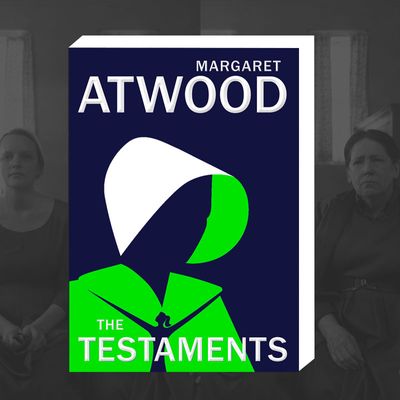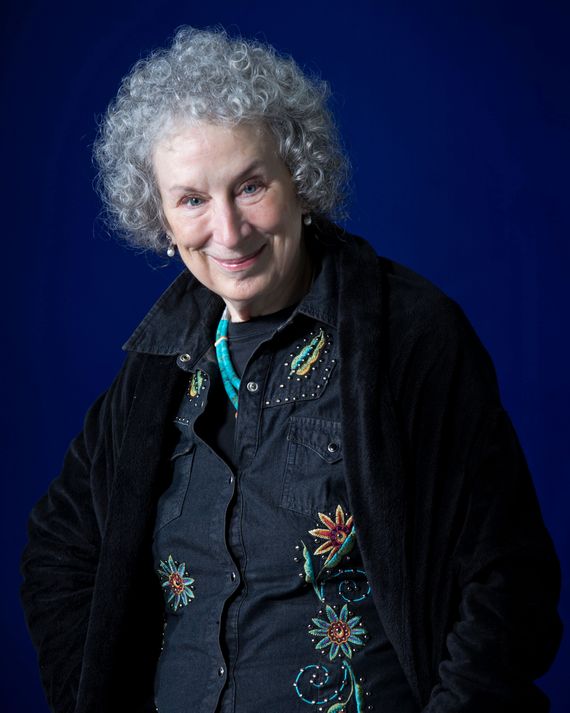
In the epilogue to Margaret Atwood’s The Handmaid’s Tale, a scholar steps onto a stage some hundred-plus years after the fall of Gilead and presents a bit of information that recontextualizes everything we’ve just read. Offred’s story, the one we’ve just received in such potent detail, was discovered on some cassette tapes found buried in a house on the “Underground Femaleroad” in what was once Bangor, Maine. Who exactly was Offred? What happened to her next? The scholars have no idea, and all the reader knows is that she has been taken away, either to freedom or her own execution. She is merely another victim of Gilead — a faceless voice with yet another tale of woe and oppression. Offred was the heroine of her own story and her own story alone. Like most of us.
She is far more than that in the TV adaptation of the genre-spanning 1985 classic. Hulu’s heroine, Offred counterpart June Osborne, morphed from trapped spider to radioactively bitten superhero over three progressively overripe seasons, giving Trump-traumatized fans the Marvelized feminist hero they were looking for, rather than the sacrificial victim of the novel. Despite Elisabeth Moss’s genius commitment to June’s every eye twitch and head cock, the character has remained alive through the sheer desperation of the show’s writers. Now, 34 years after the publication of Handmaid’s Tale, comes Atwood’s book sequel, The Testaments, accomplishing at least one great thing: moving Offred offstage. Praise effing be — to a point.
For me, the sense of relief on encountering an Offred-free sequel was personal. I’ve spent years devoting the fair share of my weekly brain power to writing about the television show, never knowing until I dug into The Testaments this week how much I’d missed the source material: those classic Atwoodian zings (“Penises,” one character thinks, “Them again.”), and the precise, ingenious details of Gileadean ritual, like the elaborate array of gown colors worn by young girls along a puberty-through-marriage spectrum. In the early going, I sensed that Atwood was well on her way to broadening and deepening the world that readers so love to fear.
Alas, just around the midway point, The Testaments triples down on the fan service, supplanting Hulu’s singular heroine with three. Where The Handmaid’s Tale shrugged off into darkness, its fearsome ambiguity leaving readers anxious about their own fates, The Testaments offers women a firm, reenergizing slap on the back, unapologetically spinning out into a redemptive crusade. If Atwood wrote The Handmaid’s Tale to let us know how bad things could get, she wrote The Testaments to remind us that we shall overcome, as some of her desperate characters sing when first imprisoned. This novel is essentially a brilliantly written inspirational slogan T-shirt. Perhaps that will stir our weary feminist hearts, but it also turns the story of Gilead’s unraveling into a less plausible parable, a parade of greatness, a one-note hymn of empowerment. This is all great fun for the tentpole crowd, but what good is a dystopian novel that simply assures us we’re all going to be okay?
Our three new(ish) voices enter the picture 15 years after the end of The Handmaid’s Tale. There’s Daisy, a teenage girl in Toronto whom we can easily guess is actually Baby Nicole, Offred’s smuggled-out offspring — though her identity is hidden even from herself. Her Gileadean counterpart is Agnes, raised in fairy-tale captivity (wicked stepmother and all) as the daughter of a commander. Both their stories — covering well over a decade in the yin and yang of their unexpectedly conjoined lives — are presented only as “transcripts” of “witness testimony,” just like Offred’s cassette tapes. But unlike Offred’s, these girls’ stories have the potential to loom large in the world, to earn them heroic status.
The third voice belongs to Aunt Lydia, that imperious, Taser-wielding Bible-camp counselor from hell whose backstory isn’t so much sketched in here as vividly painted in shades of blood red and drab brown. Hers is a written account of the Thomas Cromwell–like role she’s assumed as a Founder of the Aunts and architect of the Handmaids’ tightly regimented lives. It’s addressed to “my reader” — a subtle nod to Jane Eyre, one of Aunt Lydia’s favorite novels (ironically enough) — and has been secreted away in the Aunts’ private Hildegard Library, hilariously hidden in a copy of Cardinal Newman’s Apologia Pro Vita Sua. (Atwood’s dexterity with names and clever play with religious idiolect are a small Handmaid’s Tale pleasure that survives into the sequel.) “Who are you, my reader?” Aunt Lydia asks, “And when are you? Perhaps tomorrow, perhaps 50 years from now, perhaps never.” Like Offred, Agnes, and Nicole, she’s hoping her story will be heard — just not too soon, or by the wrong people.
If recent trends in literature have taught us anything, it’s that we’ll eventually be blinded by flashes of sympathy for the female devil. No woman in TV or literature can lately commit a crime without a roster of evidence detailing the emotional damage that led her astray. Aunt Lydia’s own apologia describes her slide into moral decrepitude, from family-court judge to a woman with a Gileadean statue erected in her honor. Unlike Nicole and Agnes, young cogs in their respective machines, Lydia is the real (cold, cruel) heart at the center of this novel, and her rise (or fall, depending on your ethical compass) makes for the most delicious reading. What a wretch Aunt Lydia is at the start, goading her readers. “Think how much worse [Gilead] could have been if not for me.” Her nasty tongue and duplicitous nature intrigue as she bobs and weaves around the inner workings of Gilead’s elite, keeping her true intentions secret and her readers in suspense. Until, that is, the novel becomes stuffed so full of sympathetic backstory that this most repugnant figure of a dazzlingly repugnant bunch simply comes apart at the seams. She stops being Aunt Lydia and turns into a Complicated Woman.
Lord, how I wanted to adore this novel, to slide into its now-familiar world and poke around with a new cast of women, to see how Atwood would stand up against the instinct to give us what we want, rather than what we need. But in the end, I regret to inform you that she succumbed to our own cultural dystopia, our brave new world in which no wish is left unfulfilled, where all feminist-horror stories give way to animated Rosie the Riveter posters.
We don’t, of course, need another version of The Handmaid’s Tale; that book ought to remain hermetically sealed as the exemplar of the genre, a sui generis giant among its lightly recalibrated imitators. (Consider the absolute deluge of dystopian feminist books in just the past couple of years: Red Clocks by Leni Zumas, The Farm by Joanna Ramos, The Water Cure by Sophie Macintosh, The Power by Naomi Alderman, and Vox by Christina Dalcher.) And it certainly doesn’t kill us to inject a little uplift into the grim daily reality of watching American democracy skid around like a cat on skates over rapidly thinning ice. But where Gilead initially succeeded was in terrifying us into a new understanding of how the world might fuck us all over and then play tiddlywinks with our anatomy. The allure wasn’t in discovering how such a world would end; it was in watching, with a little too much understanding, how it was born. “How tedious is a tyranny in the throes of enactment. It’s always the same plot,” Aunt Lydia says — and for once she is wrong, because it’s the enactment that baits us.
Perhaps that’s the fatal flaw in The Testaments — that it is, so strictly, a sequel; that it huddles around the women closest to Offred while neglecting her legacy; that it cannot do what Handmaid’s did lest it wind up a whiter shade of pale. And so it heads in the opposite direction, toward universal greatness and heroism. There are plenty of villains, to be sure — a particularly lecherous dentist, the aforementioned wicked stepmother, a Commander with a suspicious number of dead wives. But as we the readers stagger toward our own potential permutations of Gilead, novels of black-and-white don’t serve us nearly as well as those in shades of gray. If we must, as Atwood has instructed us, read The Testaments in response to our own times, why not dispel the myth that the oppressed lack only the right information and a little bit of pluck?
Where we might have had a gentle corrective to what Hulu hath wrought — a novel in the spirit of its predecessor — there is instead another swerve toward shock and gasps. Reading The Handmaid’s Tale, we cried out in pain for the women of Gilead. With The Testaments, we’re crying out in frustration.





